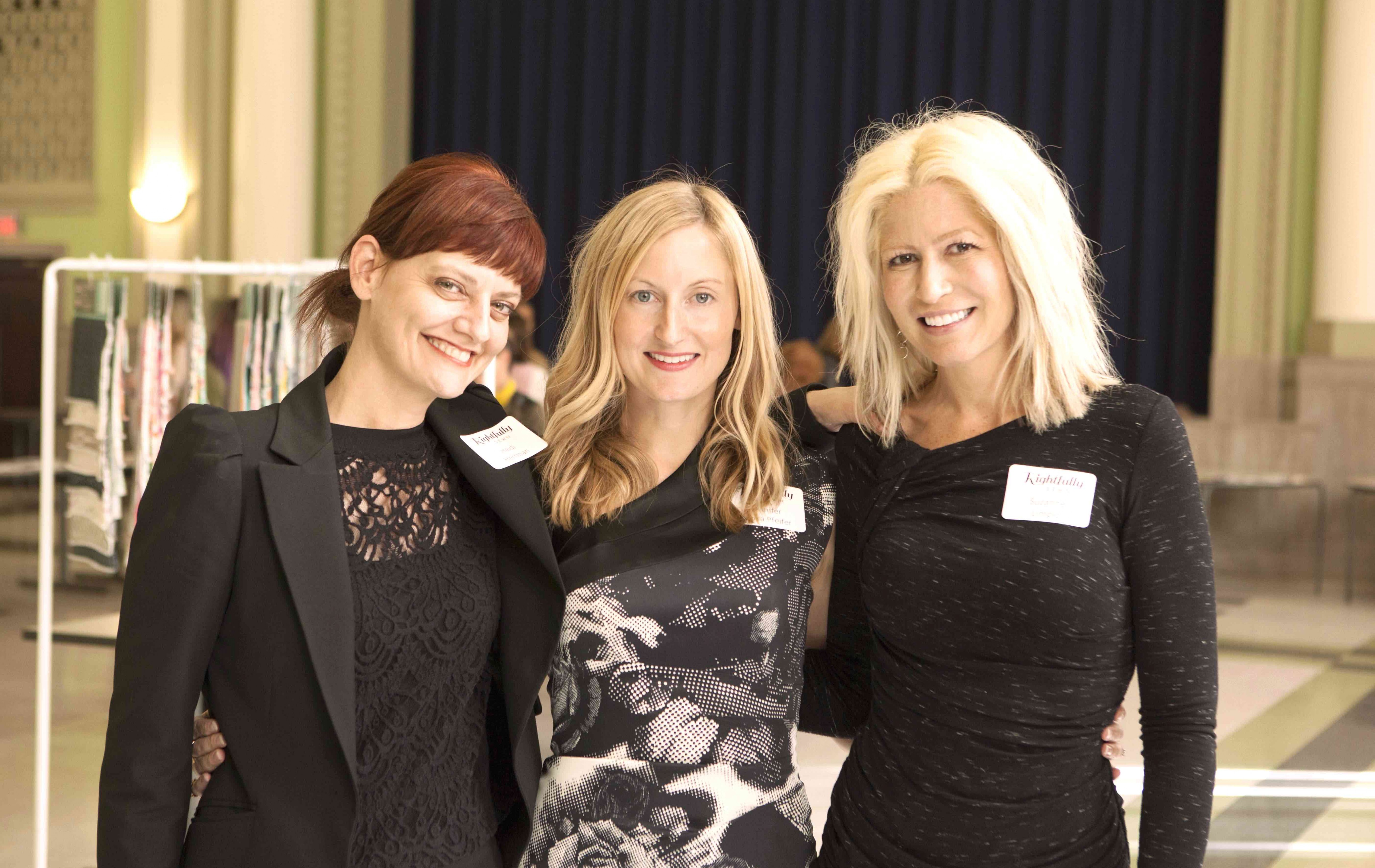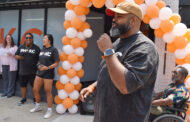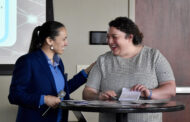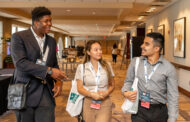Poised, posh and purposeful, Jennifer Lapka Pfeifer sits straight as a board at Kaldi’s coffee shop with unwavering eye contact.
Donning a contoured-floral blue and white dress, Lapka smiles as she poetically recalls painting in high school and learning to sew with her grandmother in rural Kansas. Those experiences fostered a love for fashion, art and collaboration that now guides her mission to empower area women and designers.
“Innovation is born from listening and involving a lot of different stakeholders,” she said. “Entrepreneurs can fall into a trap of trying to develop within a vacuum. They have this idea and they don’t talk about the idea to anyone else or get feedback, but that’s been the hallmark of my process.”
If you don’t recognize Lapka by her style, then you may know her as the founder of Rightfully Sewn, which trains at-risk women to become seamstresses for local designers.
Positioned for a launch in 2016, the organization has support from an array of powerful business leaders and art patrons in Kansas City as it prepares to train dozens of women in coming months.
A ‘mutated prairie mouse’
[pullquote]“No man, no woman is an island … Innovation is born from listening and involving a lot of different stakeholders.” – Jennifer Lapka Pfeifer[/pullquote]Lapka grew up with four siblings in Gorham, Kan., a town of 335 residents east of Hays, Kan. She married her high-school sweetheart and graduated from Fort Hays State University, only 25 minutes from her childhood home.
Although Lapka’s life began with a typical small-town Kansas trajectory, she devised a magnanimous vision for her future. And it was her ambition that broke the rural mold and that led to her self-made moniker of a “mutated prairie mouse.”
As a teenager, she dreamt of being a museum director and eventually studied art history in college. After getting married and receiving a degree at Fort Hays, she moved to England with her husband to pursue a degree in museum studies at the University of Newcastle-upon-Tyne.
How did Lapka choose a path so different than that of her small-town Kansan counterparts? While growing up, Lapka developed a creative imagination via craft projects with her siblings and family. Lapka also identifies her grandmother as an early influence.
“She taught me how to sew and I’ve been close to her my entire life,” Lapka said. “Her teaching me how to sew and do other craft projects taught me that whatever I put my mind to, I can be happy.”
So Lapka did just that. An internship brought her back to Kansas City and she worked in various program development roles at local museums and art organizations, including the Kemper Museum, The Nelson-Atkins and The Kauffman Center, always keeping her focus on becoming a museum director.
Transforming the dream
While content with her museum and art pursuits, the fashion world held a different fate for Lapka.
Since 2012, Lapka has worked with designers at Kansas City’s West 18th Street Fashion Show. In talking with designers, Lapka repeatedly heard that Kansas City lacked clothing production — a pain point that can constrain efficiency.
“It’s better to have the production nearby so designers can do quality control,” she said. “So I knew their needs existed.”
Simultaneously, Lapka saw a separate need in her day job. In her work at the Marion and Henry Bloch Family Foundation, she collaborated with many social service agencies, including those that serve at-risk women. In her work, Lapka learned that 67 percent of at-risk women will return to harmful environments within three years due to a lack of resources or other outside intervention.
Lapka created Rightfully Sewn to stitch the business strategy and the social mission together.
With her career in both the fashion and non-profit world, Lapka’s mission with Rightfully Sewn is two-fold. The organization provides seamstress training for at-risk women so they can thrive in a specialized workforce, while at the same time propels Kansas City’s fashion designers by providing local clothing production.
In addition to helping women and designers in Kansas City, Rightfully Sewn has also taken on a historical mission to boost the City of Fountains.
In the mid-Twentieth Century, Kansas City was once a hub of garment production. Ninety-five percent of clothing was made in America, and one in six women wore something made in Kansas City, according to the American Apparel and Footwear Association.
The local stage was set for female designers like Nell Donnelly, who, between 1916 and when she sold her business in 1956, made 75 million dresses. She outgrew three factories before she designed and built her own — a feat unmatched by other female businesswomen at the time.
Lapka wants to re-establish Kansas City as the fashion epicenter once again.
Although not a museum director, Lapka feels like she has developed a company that builds on her artistic and non-profit strengths.
“Fashion marries art with business, and that’s how my brain works,” she said. “It’s a mix of creativity, relationships, and development; commerce and community.”
‘No man, no woman is an island’
As Lapka develops Rightfully Sewn, she uses her artistic background and community building skills to create a company that is the vision for many, rather than just for herself.
“We’re developing women, we’re developing a workforce, we’re developing fashion designers and we’re developing products for consumers,” she said. “To balance that, I surround myself with the right people — those who are passionate about the altruistic mission.”
Lapka has made an art of calling on those who have done similar work, bringing others into a positive environment and developing the right team.
Rightfully Sewn seeks to ameliorate multiple needs in Kansas City, and Lapka knows that she can’t work alone. She attributes much of Rightfully Sewn’s credit to her team and supporters.
“No man, no woman is an island,” she said. “There’s no way this initiative could happen with just me.”







































